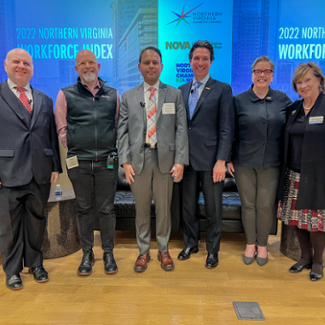Annandale, Va. – On January 25, the Northern Virginia Chamber of Commerce and Northern Virginia Community College (NOVA) released the second annual Northern Virginia Workforce Index at the Chamber’s economic outlook event, “The Future of Work.” This index, a product of a survey of regional employers, gathers actionable information on the region's current and future workforce, including tracking trends in hiring, how the workforce is shifting and how employers view the economy.

The 2022 Workforce Index, a valuable tool for economic and workforce decision making in the region, confirms that labor shortages continue to affect the region’s businesses, as 71% of employers noted increased hiring challenges in the past year. In her remarks, NOVA President Anne M. Kress acknowledged that this is “not a rosy picture” but pointed out that the adoption of skills-based training opportunities and skills-based hiring could help solve this ongoing problem.
According to the index, half of employers surveyed did not employ any interns in the last year, and only 15% recruited through apprenticeships. These work-based learning approaches provide prime opportunities for businesses to expand recruitment.
During a panel discussion, Neil Walker-Neveras, chief talent officer at M&T Bank, touched on the importance of diversifying the talent pool and talent-sourcing methods.
“We work with local community colleges for our technology and development programs, for example, our data center program,” said Walker-Neveras. “It is figuring out where the [talent] pipelines are and having a sourcing strategy that is very diverse. We are not tossing out traditional sourcing methods but we are enhancing them.”
Skills-based hiring may present an even bigger opportunity, especially since many Northern Virginia employers place a heavy emphasis on bachelor’s and graduate degrees in hiring. According to Opportunity@Work, individuals who are skilled through alternative routes (STARs) and do not hold a bachelor’s degree, make up one half of the U.S. workforce. But most businesses in Northern Virginia (67%) indicated they are only sometimes or rarely willing to accept professional experience below the bachelor’s degree level, and one in six are never willing to accept equivalent experience.
Executive Director of Economic Development for Loudoun County Buddy Rizer said that there needs to be a shift away from thinking that businesses “can hire a less skilled, more educated person for a skills-based job and pay them more than a more skilled, less educated person. Changing the way people think is the key to finding the future workforce.”
Walker-Neveras offered one potential path forward for workforce development change-makers, stating, “For us, it is natural to look outside the degree. If you’re fortunate to be in an industry that has learnability, you have an opportunity.”
As the tight labor market and high labor costs continue to make hiring and retaining talent a challenge for many businesses in Northern Virginia, the index finds that skills-based hiring, consideration of non-degree credentials/training and work-based learning all offer a means of expanding employer access to workers who are often overlooked by traditional hiring practices.
This is particularly important given an increasing focus on diversity, equity and inclusion in hiring. Employers today understand the importance of having a highly diverse workforce.
“DEI is about changing hearts and minds. It’s about changing the way we think and operate,” said Sukumar Iyer, founder of Brillient Corporation. “I’m proud to say we have a very diverse company. While we ace the normal definitions of diversity, the one I cherish most is diversity of talent. That is what makes us ‘brilliant.’”
At the end of her keynote remarks, NOVA President Kress laid out a path to success for the region. “The Workforce Index is a call to us to change the way we see talent and to seize this moment to see differently,” Kress said. “Northern Virginia is a region rich in talent—if only we can break through the paper ceiling and see the STARs all around us. We have the opportunity to expand our workforce, build an inclusive economy, and strengthen our region. Now, we need to take it.”
The executive summary and the full Workforce Index can be found here. For questions regarding the research and data used for the workforce index, please contact Tucker Plumlee, report co-author and associate director of labor market intelligence at tplumlee@nvcc.edu. For media questions regarding NOVA, please contact Hoang Nguyen, associate director of external communications at hdnguyen@nvcc.edu. For media questions for the Chamber, please contact Jen Williamson, vice president of workforce and member engagement at jwilliamson@novachamber.org.